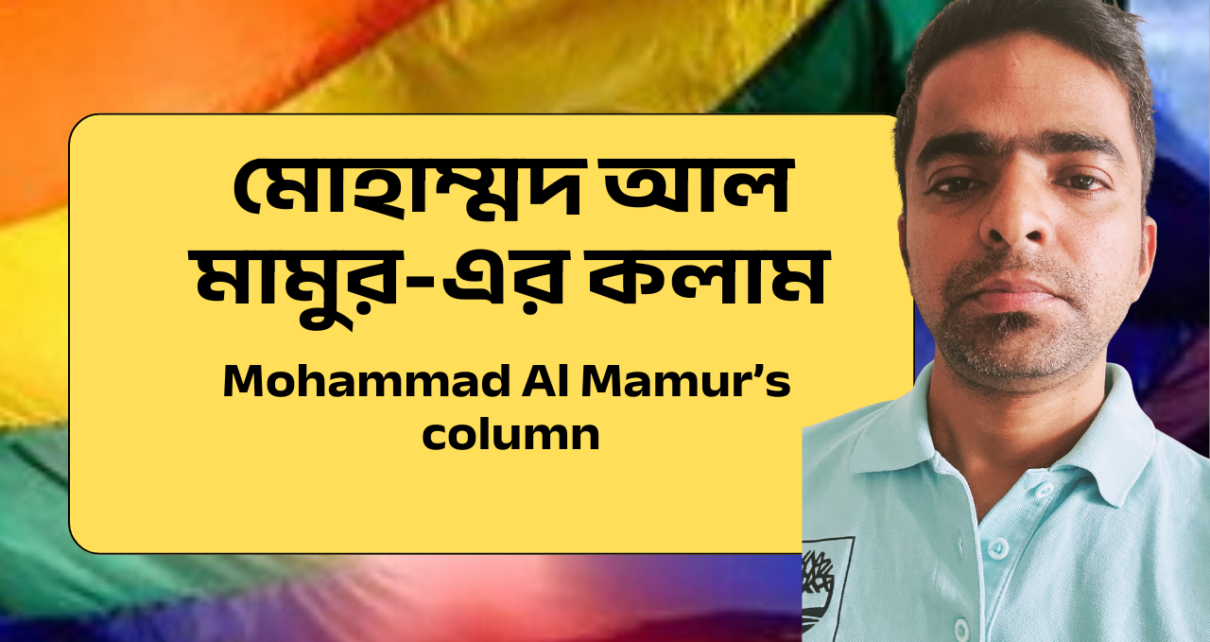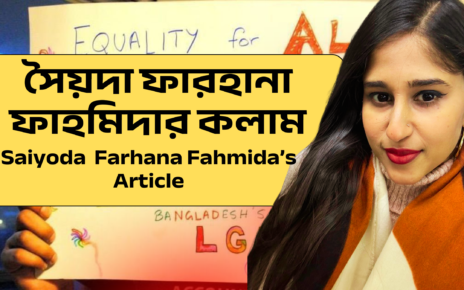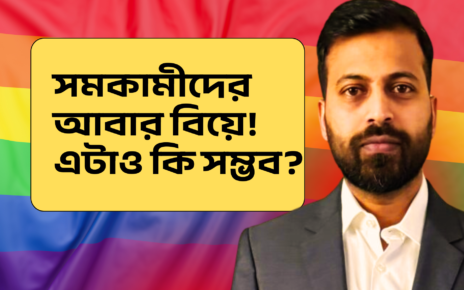Mohammad Al Mamur, United Kingdom
I. Introduction – Silence, Stigma, and Survival
In Bangladesh, queerness exists in the shadows. It is whispered about, denied, and punished by a society that often mistakes conformity for morality. Behind the bright façade of progress and democracy lies an unspoken truth: to live openly as lesbian, gay, bisexual, transgender, or queer is to live at constant risk. That risk is codified in law, reinforced by religious conservatism, and weaponised by social prejudice.
The story of LGBTQ+ people in Bangladesh is not simply a cultural one; it is a constitutional and humanitarian crisis. The state’s continuing endorsement of colonial-era legislation, particularly Section 377 of the Penal Code, institutionalises discrimination and empowers both state and non-state actors to police love itself. In the name of tradition and faith, personal dignity has been criminalised.
II. Section 377 – A Colonial Relic Turned Religious Weapon
Section 377, enacted under British rule in 1860, criminalises “carnal intercourse against the order of nature.” The provision was a Victorian instrument of moral control, never a reflection of indigenous Bangladeshi ethics. Yet, more than 160 years later, it remains intact, carrying a maximum sentence of life imprisonment.
While many former British colonies—India, Nepal, and even parts of the Caribbean—have repealed or read down similar provisions, Bangladesh clings to it with fervour. The reason is not legal inertia but political calculation. Successive governments, wary of losing conservative support, have treated LGBTQ+ rights as expendable collateral. Thus, a colonial statute has merged seamlessly with religious populism to form a double cage—one built of law, the other of dogma.
Section 377 does more than criminalise acts; it legitimises surveillance and extortion. Police raids on private gatherings, arbitrary arrests, and harassment of NGOs working with sexual-minority communities are justified under its vague phrasing. The law has created a climate where blackmail thrives and justice retreats.
III. Religion, Rhetoric, and Political Expedience
Bangladesh defines itself constitutionally as a secular republic, yet Islam remains the state religion. In practice, this duality enables selective invocation of faith to silence dissent. Extremist clerics and political opportunists alike portray LGBTQ+ visibility as a Western imposition, an affront to “Islamic values.” Sermons denouncing homosexuality as a sin or “disease” are broadcast without restraint, while calls for compassion or reform are branded blasphemy.
Religious militancy has turned theological interpretation into a weapon. Groups such as Hefazat-e-Islam mobilise protests not only against queer rights but against women’s autonomy and secular education. Their rhetoric equates tolerance with apostasy. In this atmosphere, politicians routinely capitulate; defending LGBTQ+ citizens risks being painted as “anti-Islamic.” The result is state-sanctioned silence—a moral abdication disguised as cultural sensitivity.
IV. The Human Cost – From Hiding to Exile
For queer Bangladeshis, legality is less a concept than a constant threat. Same-sex partners cannot rent homes together without deceit. Transgender individuals, despite limited legal recognition as a “third gender,” face daily violence from police and mobs alike. Employment discrimination is unaddressed, mental-health services are scarce, and family rejection is rampant.
The assassination of Xulhaz Mannan, founder of the country’s only LGBTQ+ magazine Roopbaan, in 2016, stands as a grim marker. He was stabbed to death in his Dhaka home by Islamist militants who accused him of “promoting homosexuality.” His killing sent a chilling message: visibility equals vulnerability. Since then, dozens of activists have fled abroad or gone underground. Those who remain live in constant fear—moving frequently, encrypting communications, erasing traces of their identity online.
V. International Obligations vs. Domestic Reality
Bangladesh is a signatory to numerous international instruments, including the International Covenant on Civil and Political Rights (ICCPR) and the Convention on the Elimination of All Forms of Discrimination Against Women (CEDAW). Both enshrine principles of equality, privacy, and dignity. Yet, enforcement within national boundaries is selective. The government invokes sovereignty to resist “Western interference,” even as it seeks international aid predicated on human-rights commitments.
Periodic reviews by the United Nations Human Rights Council have urged repeal of Section 377 and protection for sexual minorities. Each time, Bangladesh’s representatives assure “cultural sensitivity” while offering no legislative reform. This duplicity—acknowledging rights in Geneva while denying them in Dhaka—exemplifies how human rights become rhetoric when unaccompanied by political will.
VI. Law as a Tool of Fear
In the Bangladeshi context, Section 377 functions less as a prosecutorial instrument and more as a threat. Police rarely secure convictions under it, but its mere existence suffices to intimidate. Victims of assault or extortion cannot safely seek redress because reporting a crime may expose them to prosecution. Thus, the law operates as a shield for abusers and a muzzle for the abused.
Legal scholars within the country who advocate reform face censorship and professional risk. Courts, while occasionally progressive in other spheres, remain silent on this issue. No constitutional challenge has advanced, partly because litigants fear reprisal and lawyers hesitate to be publicly associated with “immorality.” Silence, therefore, becomes complicity.
VII. Extremism and the Myth of Morality
The rise of religious extremism has further narrowed civic space. Militant factions view homosexuality and atheism as twin evils corrupting society. Their campaigns of intimidation—fueled by online hate speech—are tolerated, and at times tacitly supported, by sections of law enforcement. Bloggers and freethinkers have been murdered in public for questioning dogma; LGBTQ+ activists know their names could be next on the list.
Such violence is often framed as the spontaneous rage of the pious. In truth, it is the logical consequence of decades of state appeasement and clerical impunity. When governments trade justice for votes, mobs inherit the law.
VIII. The Psychological Toll
Constant concealment extracts a devastating psychological price. A 2022 survey by Bandhu Social Welfare Society reported alarming rates of depression, anxiety, and suicidal ideation among LGBTQ+ youth. The criminalisation of identity fosters internalised shame. Many undergo forced “conversion therapy” by religious healers. Families disown children; universities expel students; employers terminate staff—all under the pretence of preserving moral order.
Mental-health professionals rarely offer support, constrained by stigma and the risk of being labelled “perverts’ allies.” Consequently, resilience becomes both weapon and wound: survival demands emotional numbness.
IX. The Role of Civil Society
Despite repression, pockets of resistance persist. Informal networks, underground support groups, and online communities provide solace and advocacy. NGOs like Bandhu, Boys of Bangladesh, and Roopbaan (before its closure) have documented abuses and trained health workers in inclusive care. Yet their existence is precarious: registration hurdles, donor scrutiny, and police harassment threaten closure at any time.
Foreign missions and UN agencies occasionally fund awareness projects, but participants risk exposure. Activists use coded language—“gender diversity,” “health outreach”—to mask what should be straightforward human-rights work. Survival depends on euphemism.
X. The Way Forward – Reform, Education, and Courage
The repeal of Section 377 is not merely a legal necessity but a moral imperative. Parliament possesses the authority to strike down this colonial vestige, yet lacks the courage. Judicial activism could intervene, interpreting constitutional guarantees of equality and privacy to decriminalise same-sex relations, as India’s Supreme Court did in Navtej Singh Johar v. Union of India (2018). Civil-society coalitions must continue strategic litigation and advocacy, leveraging international mechanisms for pressure.
Education is equally crucial. The national curriculum should include comprehensive sexuality education grounded in human rights, not fear. Media outlets must adopt ethical guidelines for reporting on LGBTQ+ issues to counter hate propaganda. Religious leaders willing to preach tolerance should be given platforms, challenging the monopoly of extremism over moral discourse.
Above all, protection mechanisms—safe houses, emergency hotlines, legal aid—must be established for at-risk individuals. The state’s duty is not to legislate virtue but to safeguard life.
XI. Conclusion – Love Beyond Fear
Bangladesh stands at a moral crossroads. To continue enforcing Section 377 and tolerating violence is to betray its own constitutional promise of equality and its liberation-war ethos of human dignity. The persecution of LGBTQ+ citizens is not an expression of culture; it is a continuation of colonial and theocratic control.
Repealing unjust laws and confronting bigotry will not erode faith or tradition—they will redeem them. A nation’s greatness is measured not by its piety but by its humanity. For every queer Bangladeshi forced into silence or exile, the republic itself loses a voice, a talent, a dream. The struggle for equality is therefore not the fight of a minority—it is the unfinished chapter of Bangladesh’s liberation.


